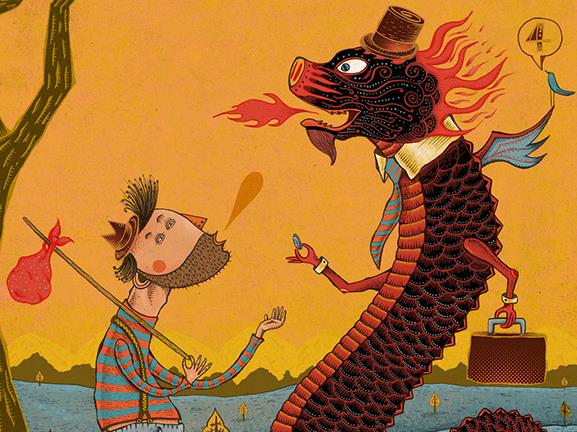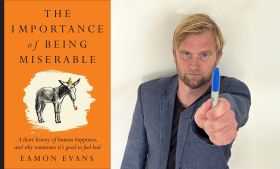The stunning front cover depicts a bedraggled man in tattered pants looking up at a particularly well-dressed fire-breathing dragon holding a penny in its right hand and a briefcase in the other. Unconventional yet arresting, the illustration exemplifies the modus operandi of one-year old Australian literary journal, Canary Press.
Part of the latest issue features stories written by eight-year-old children reinterpreted by a stable of acclaimed Australian writers from Margo Lanagan and Ryan O’Neill to Ben Walter and Maxine Beneba Clark. It is an intriguing premise that hails the boundless imaginations of young minds, debunks traditions that equate age to expertise, and celebrates the unparalleled ability for a small seed of an idea to germinate into something deeper and darker.
Robert Skinner’s preamble harks back to when he was derided as a child for writing a ‘disgusting’ poem about ‘a spider covered in poo and happiness’ – something I’d be raring to read in any case. Among Skinner’s humorous flashbacks to what he felt were ridiculous inhibitions imposed on a young child’s conceptions of the world is a striking call to writers to forget everything they are taught and constantly push boundaries.
‘The best adult writers, I think, or certainly the most imaginative ones, have gleefully unlearnt what they were trained in – in terms of what is decent and possible and literary and acceptable – or were never dulled by it,’ Skinner says.
Tapping into this idea, Skinner ‘throws a spanner in the works of literary routine’ by making adult writers base a piece of fiction around young children’s ideas. The result is a set of four stories brimming with inescapable humour, wit and surprising snippets of age-old wisdom.
Based around Mali Hawke’s story of the discovery of a magic lamp by a wandering married couple, Margo Lanagan’s Blood of an Englishman is a treatise on the ethical minefield of instant gratification, the expectations of marriage and the inevitability of time – enlivened by a healthy dose of magic realism.
Inspired by Felix Menashe’s story about three pencils and an eraser, Ryan O’Neill pens four devastating vignettes on the rigours of old age, the pain and subsequent acceptance of losing a loved one, and the breakdown of a marriage. Menashe’s cutesy account of friendship is transformed into a darker, stark narrative teeming with unresolved tension, sadness and despair.
Tsamaya Gooding’s story on frogs and abandonment stimulates two reinterpretations – Verity Russo’s Swallowed and Ben Walter’s Soft Green Skin, both vastly different in their conceptualisation and styles.
Meanwhile, Maxine Beneba Clarke extrapolates Seth’s story on a girl called Jasmin who gets stuck in an elevator but is eventually rescued into a meditation on familial bonds and the confusion inherent in being a child and discovering oneself in a web of other people’s connections.
Each reimagining eschews the children’s happy endings in favour of something murkier, where weighty adult themes are explored and debated. In some of the stories – like Russo’s Swallowed and Beneba Clarke’s Ummi – a child’s lens is suitably employed. Others, like Lanagan’s portrait of humdrum existence, is injected with a light-hearted gaiety that was initially found in the child’s story that she was modelling her account after.
Frogs reappear in William Broom’s short story Restaurant, while Unaccompanied Minors is an entertaining deliberation on the divides of race and class. But it is the reprinted Brokeback Mountain – the commended short story by Annie Proulx that was later made it into an American epic drama film directed by Ang Lee – that is as powerful and shattering on film as it is on page.
Condensing the twenty-year relationship between Jack and Ennis into a series of linear episodes examining the traditional American attitude towards homosexuality, the burden of forced domesticity, and the subsequent repression that takes place, Proulx adroitly fosters suspense through the few words afforded to her – culminating in a harrowing finale. That Proulx has the ability to knock readers about and forge such affecting characters in 14 pages bears testament to the power of short stories, so deftly alluded to in Canary Press’s fourth edition.
Rating: 4 ½ stars out of 5
The Canary Press Issue 4: Story Magazine
Edited by Robert Skinner
Paperback
55 pages
RRP: $12
Published by The Canary Press
ISBN: 9772201867003






